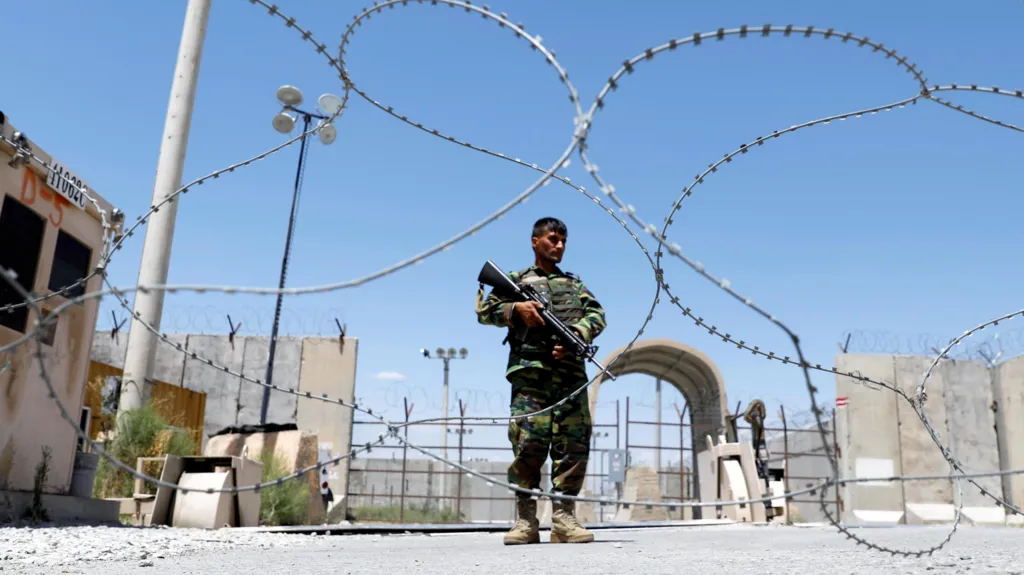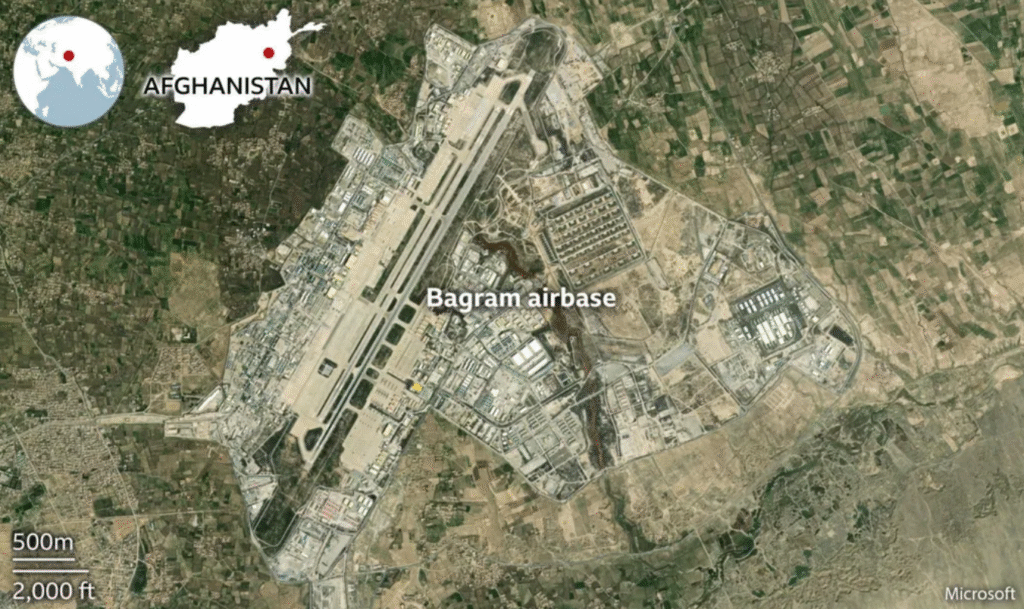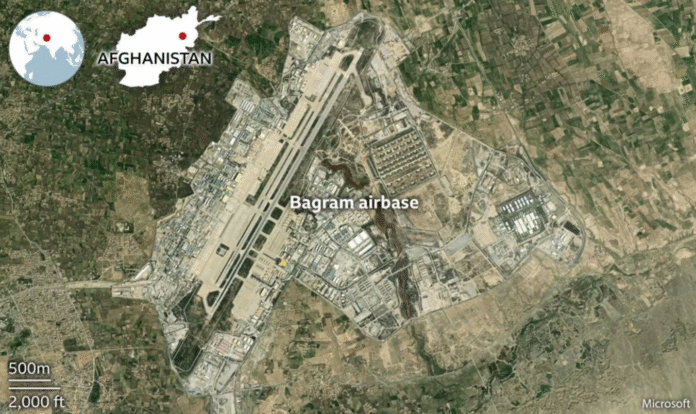Taliban Trump Airbase Dispute: Growing Tensions Over Bagram
The latest Taliban Trump airbase dispute has reignited debates about Afghanistan, U.S. foreign policy, and the balance of global power. Former U.S. President Donald Trump recently suggested that America should “take back” Bagram airbase, a strategic military hub once central to Nato’s presence in Afghanistan. But Taliban officials have firmly dismissed the idea, calling it “completely rejected.”
This war of words highlights the fragile state of U.S.–Afghan relations and underscores the strategic importance of Bagram, not only for Afghanistan but also for its proximity to China.

Background: Bagram’s Role in Afghanistan
For nearly two decades, Bagram airbase served as the epicenter of Nato and U.S. operations during the Afghanistan war. Located north of Kabul, it was the launchpad for countless missions, airstrikes, and logistics operations.
The U.S. formally handed over the base to Afghan forces in 2021, just weeks before the Taliban’s rapid takeover of the country. Its closure marked the end of a 20-year military presence.
Now, the Taliban Trump airbase dispute brings Bagram back into the global spotlight.
Trump’s Comments on Retaking Bagram
During a press conference in the UK, Trump criticized the U.S. decision to leave Bagram, saying: “We gave it to them for nothing.”
He argued that his original plan was to keep the base, not for Afghanistan, but for its strategic location near China. Trump went further, claiming that Bagram is just an hour away from where China develops nuclear weapons.
While his remarks stirred global debate, a BBC Verify investigation noted that the closest Chinese nuclear testing site is about 2,000 km away, far from Trump’s suggested “one-hour” distance.
Taliban’s Strong Rejection
In response, Taliban foreign ministry official Zakir Jalal issued a firm dismissal of Trump’s statements. Posting on X (formerly Twitter), he reminded the world:
“Throughout history, Afghans have not accepted a military presence… this possibility was completely rejected during the Doha talks.”
He further stressed that while military presence is off the table, the Taliban remains open to other forms of engagement with the U.S. and international community.
This statement marks the Taliban’s effort to project sovereignty while signaling willingness for dialogue in non-military matters.
China’s Role in the Dispute
The Taliban Trump airbase dispute has fueled speculation about whether China has established any presence at Bagram. Trump has repeatedly claimed so, but available evidence tells a different story.
A BBC investigation examined 30 satellite images taken between 2020 and 2025 and found no signs of Chinese military presence at the base. Activity at Bagram has been minimal since the Taliban takeover.
China, for its part, responded diplomatically. A spokesperson from Beijing’s foreign ministry stated: “China respects Afghanistan’s territorial integrity and sovereignty. The future of Afghanistan should be in the hands of Afghan people.”
This response aligns with China’s cautious approach, avoiding direct involvement while expanding its economic and diplomatic footprint in the region.
U.S.-Taliban Talks Continue
Despite the heated rhetoric, the U.S. and Taliban remain engaged in dialogue. The latest meetings focused on Americans detained in Afghanistan, showing that communication channels remain open, even as tensions rise.
The Taliban Trump airbase dispute underscores the complex relationship between Washington and Kabul, one marked by mistrust, history, and necessity.
Why Bagram Still Matters
The strategic value of Bagram extends beyond Afghanistan. Its location places it near South Asia, Central Asia, and China, making it a geopolitical prize.
-
Military Value – As a forward operating base, Bagram could provide rapid deployment across Asia.
-
Symbolic Power – Retaking it would signal U.S. dominance, but abandoning it reflects the cost of America’s longest war.
-
Regional Influence – Whoever controls Bagram can project power across volatile regions, from Iran to Pakistan.
For these reasons, the Taliban Trump airbase dispute is not merely symbolic but tied to broader strategic realities.
Political Impact in the U.S.
Trump’s remarks also play into domestic politics. As the U.S. gears up for another election cycle, Afghanistan remains a talking point for Republicans criticizing the Biden administration’s withdrawal strategy.
By focusing on Bagram, Trump positions himself as tougher on China and critical of what he frames as a strategic blunder.

Global Reactions to the Dispute
-
Estonia’s NATO allies, already on edge due to Russian airspace violations, see Trump’s remarks as destabilizing.
-
European analysts argue that reopening the Afghan chapter could strain already limited Western resources.
-
Regional experts warn that such rhetoric could embolden the Taliban to harden its stance against future negotiations.
The Taliban Trump airbase dispute is therefore not just about one airfield, it’s about global perceptions of U.S. resolve and Taliban authority.
Conclusion
The Taliban Trump airbase dispute shows how even years after U.S. withdrawal, Afghanistan remains central to debates about power, security, and influence. While Trump argues for reclaiming Bagram, the Taliban insists foreign military presence is unacceptable.
Caught in between are broader questions: How will global powers engage Afghanistan? And could disputes like this reopen old wounds in a fragile region?
One thing is clear: the shadow of Bagram continues to loom large over world politics.

